At TruFluency Kids, we’re all about helping your children become bilingual in English and Spanish. Some of our clients are English-speaking parents who want their kids to learn Spanish.
But we also work with families where at least one parent is a native Spanish speaker. That surprises a lot of people. And I think that’s because we often assume that parents automatically pass along their native language to their kids.
In reality, though, it’s not that easy. So why is that? In this article, I want to talk about some reasons that I’ve observed. I’ll also share stories of families that have had their own struggles around passing on the parents’ native language. I hope you’ll come away with some information and tips that are helpful to your own family.
But first, though, I want to stress that you’re not a bad parent if your kids don’t speak your native language. And you’re not a bad child if you never became fluent in your parents’ native language. Deciding how you’ll handle multiple languages in your home can be really emotionally charged, so cut yourself some slack.
Language Affects Relationships
There are many different reasons why kids don’t learn their parents’ native language. One that I see a lot is pretty simple: time. I don’t have to tell you how busy parents are. Between jobs and other responsibilities, it can be hard to prioritize giving kids exposure to your native language.
Families in which the parents have language differences have their own set of challenges. For example, one parent is a native Spanish speaker who’s also fluent in English, while the other is a native English speaker who doesn’t speak Spanish. The Spanish-speaking parent may get tired of translating what they’re saying to the kids in Spanish for the other parent. Or the English-only parent might start feeling left out.
Natasha Tynes describes a situation like this in an essay for The Washington Post. She speaks Arabic and English, while her husband speaks English only. Tynes feels disappointed that her kids don’t speak Arabic. But she also recognizes the challenges in trying to raise bilingual kids — including how it affects how she and her kids relate to her husband.
“Having an all-Arabic conversation when their non-Arab dad is present makes for an uncomfortable family dinner,” she writes.
In other families, parents make a deliberate choice not to pass along their native language because they believe it’s better for their kids if they don’t. Here in the U.S., it’s an unfortunate reality that people get shamed or discriminated against for speaking a language other than English in public.
It’s only natural that parents who have endured this kind of treatment don’t want their kids to experience it. Or they may worry that if they speak their native language at home, then their kids will speak English with an accent and have trouble fitting in with their peers.
Some parents believe that speaking their native language at home will actually be bad for their kids. They may have gotten well-intentioned, but misinformed advice. Or they may simply have outdated misconceptions — like that speaking two languages at home will cause their kids to have speech delays. If their child already has speech or other developmental delays, they may fear that speaking two languages will make them worse.
That’s what happened in Izzy Bloom’s family. Her mother’s native language is Japanese. She had every intention of raising her kids to speak both Japanese and English. After Bloom’s older brother, Max, was born, their mom spoke to him in Japanese for the first three years of his life.
But when Max was diagnosed with a rare genetic disorder called Prader-Willi Syndrome, all of that stopped. Medical professionals advised the family that speaking Japanese around Max could cause him to have trouble learning English. As a result, Bloom’s mother didn’t speak Japanese to her, either.
Rebelling Through Language
Parents who are trying to share their native language with their kids might also just feel that they can’t compete with the dominant language their kids are exposed to. Here in the U.S., kids hear English at school, in their favorite shows, when they’re hanging out with their friends, and on and on.
Remember, too, that all kids are working to figure out who they are as individuals who are separate from their parents. As they forge their own identities, they might rebel over using a parent’s language at home instead of the language that surrounds them in the culture at large.
In The Atlantic, Kat Chow writes about how a conflict like this played out in her own family. Her parents mostly spoke to her and her sister in their Chinese dialects. They were also fluent in English.
But Chow’s sister came home from kindergarten one day and insisted that their parents only speak to her in English. After that, they became a predominantly English-speaking household.
Zi-Ann Lum, an editor with HuffPost Canada, also rebelled over using her Chinese mother’s native language. She writes:
By age seven, I was sparring with her every weekend because I was hell-bent against going to Chinese school. By the time I was eight, she had finally given up. Her good intention to raise a bilingual child had been broken by tantrums.
Tips for Sharing Your Language
Now that we’ve talked about why kids up not speaking their parents’ native language, let’s cover some tips that can help you address these challenges:
- First, if you’ve been told that raising your child to be bilingual will cause language delays, please know that just isn’t true. Betty Yu, a speech and language professor at San Francisco State University, said, “waves and waves of data” have shown that being bilingual or multilingual has cognitive, social and cultural benefits for children.
- If your child has been diagnosed with a delay or disorder, make sure that you have the latest research before you decide against raising them to be bilingual. Remember Izzy Bloom, whose mom didn’t use Japanese at home because the family believed it would cause further delays for Bloom’s brother, who has Prader-Willi Syndrome? As an adult, Bloom discovered that there’s no empirical data that bilingualism hurts language development for children with Prader-Willi.
- Finally, I want to share some thoughts from Aga Pedrak, writing for mothertongues.ie. Pedrak points out that kids might hesitate to speak their non-dominant language if they don’t feel like they’re very good at it. If that language is your native tongue, it can be hard to hold yourself back from correcting their errors. But this can undermine their confidence even more. Instead, Pedrak says, “use the correct word or phrase to naturally show the child the correct form, rather than pointing out their mistakes.”
- She also addresses a point I talked about back at the beginning of this article: A parent speaking their native language at home does not mean that their child will automatically pick up that language. You’ll have a better chance of passing your language along if you create what Pedrak calls a “rich language environment.” Choose books, games and other media in the target language. Give kids opportunities to use their second language with other people besides you. For example, make regular video calls to family and friends who are also native speakers.
Need Help Teaching Your Children Your Native Language at Home?
If you’re trying to help your kids learn your native language, how’s it going? What’s working? And what isn’t? If you speak Spanish and you want your kids to as well, TruFluency Kids can make things a whole lot easier. We offer convenient, small-group online classes that are tailored to your kids’ experience levels with Spanish.
Check our testimonials and take a trial class. Then, enroll your kids for our next four-week session.


